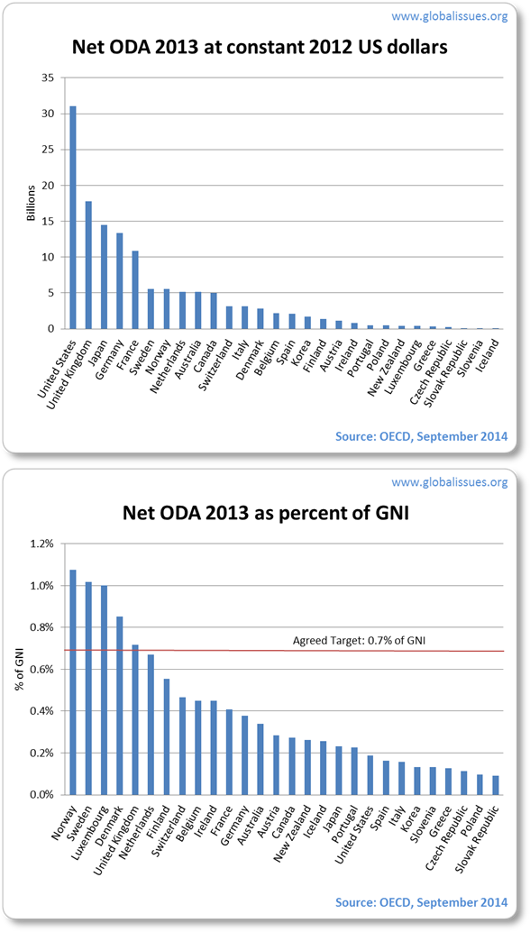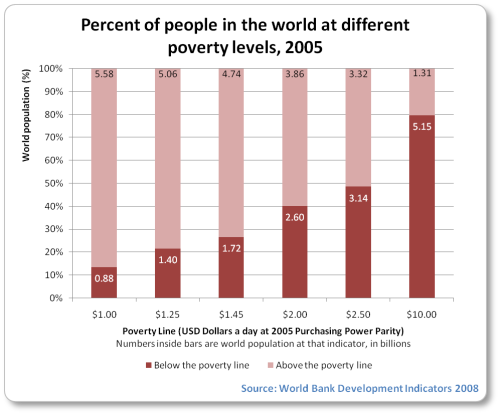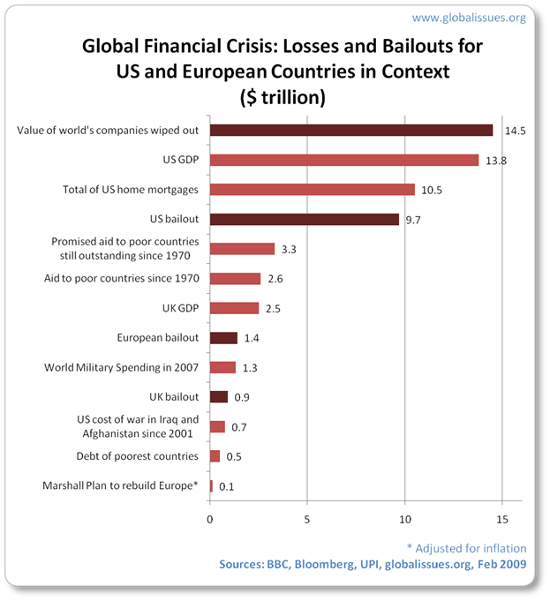Today, around 21,000 children died around the world. This daily tragedy, from poverty and other preventable causes, rarely makes headline news.
Latest world news
World
Rising Temperatures Drive Human-Wildlife Conflict in Zimbabwe
- Inter Press Service

BULAWAYO, Zimbabwe, May 17 (IPS) - Rising temperatures are being blamed for an increase in human-wildlife conflicts in Zimbabwe as animals such as snakes leave their natural habitat earlier than usual.
Women Organize to Fight Coastal Erosion in Southeastern Brazil
- Inter Press Service

ATAFONA, Brazil, May 17 (IPS) - Sonia Ferreira watched as the sea toppled buildings all around her for years. Finally, the impact of the rise in sea levels wrecked her home in 2019. Fishermen find their access to a fishing port limited, affecting their livelihoods. The residents of the coastal town of Atafona in southeastern Brazil count their losses to rising sea levels and climate change.
More Diversified Trade Can Make Middle East & Central Asia More Resilient
- Inter Press Service

WASHINGTON DC, May 17 (IPS) - Dislocations from the pandemic, geoeconomic fragmentation, and Russia’s war in Ukraine have shifted world trade dynamics. While this has created challenges, the redirection of trade has also generated new opportunities, particularly for the Caucasus and Central Asia.
UN rights office urges Sri Lanka to reveal fate of the disappeared
- UN News

The UN human rights office, OHCHR, on Friday urged the Sri Lankan Government to take decisive action to uncover the fates and locations of tens of thousands of individuals subjected to enforced disappearances over the years and to hold those responsible accountable.
Israel refutes South Africa’s accusations at UN world court
- UN News

The UN International Court of Justice (ICJ), on Friday, heard the response from Israel on the case brought forward by South Africa requesting emergency provisional measures to immediately halt Israeli military operations under way in Rafah, in southern Gaza, where over one million Palestinians were sheltering after having been displaced from elsewhere in the enclave.
Gaza: Aid delivery via floating dock welcomed, but land routes ‘more important’
- UN News

Trucks carrying desperately needed aid into Gaza have started moving ashore on the temporary floating dock built by the United States military, but this is not enough to meet the needs of civilians, UN humanitarian affairs office, OCHA, said on Friday.
Crimes against nature: UN agency puts environmental legislation under scrutiny
- UN News

Global efforts to prevent crimes against nature and bring offenders to justice are being hampered by glaring differences in environmental protection laws among countries and regions, UN crime prevention experts said on Friday.
UN’s rights chief says horrified by Sudan escalation as famine draws nearer
- UN News

The UN’s top human rights official has personally intervened to try to stop spiralling violence in Sudan that’s having a terrifying impact on millions of civilians, who humanitarians say are “staring famine in the face”.
Afghan Women Struggle with Soaring Mental Health Issues
- Inter Press Service

May 16 (IPS) - Afghanistan is grappling with a growing crisis of mental illness, particularly among its women, as highlighted in a United Nations report. Officials from the mental health department at Herat regional hospital have observed a concerning uptick in the number of women afflicted by psychological disorders in the province.
Solomon Islands: A Change More in Style than Substance
- Inter Press Service

LONDON, May 16 (IPS) - There’s change at the top in Solomon Islands – but civil society will be watching closely to see whether that means a government that’s grown hostile will start doing things differently.
Jeremiah Manele is the new prime minister, emerging from negotiations that followed April’s general election. He’s part of OUR Party, led by outgoing four-time prime minister Manasseh Sogavare. The party came first, winning 15 of 50 constituencies, but several incumbents who stood for it lost their parliamentary seats, and Sogavare only narrowly held his. Weakened, Sogavare stood aside to allow Manele to prevail as the consensus candidate of the post-election coalition his party stitched together.
- More stories…
Climate
Rising Temperatures Drive Human-Wildlife Conflict in Zimbabwe
- Inter Press Service

BULAWAYO, Zimbabwe, May 17 (IPS) - Rising temperatures are being blamed for an increase in human-wildlife conflicts in Zimbabwe as animals such as snakes leave their natural habitat earlier than usual.
Women Organize to Fight Coastal Erosion in Southeastern Brazil
- Inter Press Service

ATAFONA, Brazil, May 17 (IPS) - Sonia Ferreira watched as the sea toppled buildings all around her for years. Finally, the impact of the rise in sea levels wrecked her home in 2019. Fishermen find their access to a fishing port limited, affecting their livelihoods. The residents of the coastal town of Atafona in southeastern Brazil count their losses to rising sea levels and climate change.
Crimes against nature: UN agency puts environmental legislation under scrutiny
- UN News

Global efforts to prevent crimes against nature and bring offenders to justice are being hampered by glaring differences in environmental protection laws among countries and regions, UN crime prevention experts said on Friday.
Ocean Action on Global Agenda as Negotiations to Save Biodiversity Deepen
- Inter Press Service

NAIROBI, May 15 (IPS) - The oceans are as fascinating as they are mysterious. Home to the largest animals to ever live on Earth and billions of the tiniest, the top 100 meters of the open oceans host the majority of sea life, such as fish, turtles, and marine mammals. But there is another world far below the surface. In the belly of the ocean, there are seamounts—underwater mountains that rise 1,000 meters or more from the seafloor.
SBSTTA and SBIBiodiversity Meetings Crucial for the Global South Begin
- Inter Press Service

NAIROBI, May 14 (IPS) - The 26th meeting of the Subsidiary Body of Scientific, Technical, and Technological Advisors (SBSTTA) of the United Nations Convention on Biological Diversity (UNCBD) started in Nairobi, Kenya, on Monday. Over 1,400 delegates, including 600 representing signatories or parties from over 150 countries, are present for the seven-day meeting at the headquarters of the United Nations Environment Programme (UNEP). A large number of members from Indigenous Peoples and other observer organizations, including women’s groups, are also attending the meetings.
Bringing the World's Food Production in Line with Global Climate Goals
- Inter Press Service

NORTHAMPTON, Massachusetts, May 14 (IPS) - Food systems—how we grow, transport, prepare, and dispose of the food we eat—are responsible for roughly one-third of all global greenhouse gas emissions. And those gases are changing the climate, which in turn is disrupting the food supply. It would seem to be a classic vicious circle.
Biodiversity Masterplan: Negotiations on Crucial Science, Technology for Implementation Underway
- Inter Press Service

NAIROBI, May 13 (IPS) - The triple planetary crises of climate change, biodiversity loss, pollution, and waste are escalating. At the current pace, the world is on track to lose one quarter of all plant and animal species by 2030, with one species already dying out every 10 minutes. One million species face extinction. Human activity has already altered three-quarters of the land on Earth and two-thirds of the ocean.
‘Untold harm to nature’ from wildlife trafficking, warns UN crime agency
- UN News

Despite two decades of worldwide efforts, more than 4,000 precious wildlife species still fall prey to trafficking every year, a new report by the UN crime and drugs prevention office, UNODC, showed on Monday.
Madagascar: Coordination, convergence and change from the grass roots up
- UN News

How can people be best supported during humanitarian crises with limited aid budgets and what can be done to help those same people break out of the cycle of dependency caused by multiple crises and move towards more sustainable development?
Latin America and the Caribbean Hit with Record-Breaking Heat and Other Climate Effects in 2023
- Inter Press Service

DOMINICA, May 10 (IPS) - Every year for the last four years, a collaborative effort involving scientists and other experts has assessed the state of the climate in Latin America and the Caribbean. The findings have revealed increasingly alarming trends for the world’s second-most disaster-prone region.
- More stories…
Health
Rising Temperatures Drive Human-Wildlife Conflict in Zimbabwe
- Inter Press Service

BULAWAYO, Zimbabwe, May 17 (IPS) - Rising temperatures are being blamed for an increase in human-wildlife conflicts in Zimbabwe as animals such as snakes leave their natural habitat earlier than usual.
Afghan Women Struggle with Soaring Mental Health Issues
- Inter Press Service

May 16 (IPS) - Afghanistan is grappling with a growing crisis of mental illness, particularly among its women, as highlighted in a United Nations report. Officials from the mental health department at Herat regional hospital have observed a concerning uptick in the number of women afflicted by psychological disorders in the province.
SBSTTA and SBIBiodiversity Meetings Crucial for the Global South Begin
- Inter Press Service

NAIROBI, May 14 (IPS) - The 26th meeting of the Subsidiary Body of Scientific, Technical, and Technological Advisors (SBSTTA) of the United Nations Convention on Biological Diversity (UNCBD) started in Nairobi, Kenya, on Monday. Over 1,400 delegates, including 600 representing signatories or parties from over 150 countries, are present for the seven-day meeting at the headquarters of the United Nations Environment Programme (UNEP). A large number of members from Indigenous Peoples and other observer organizations, including women’s groups, are also attending the meetings.
The World Must Not Abandon the Mothers of Gaza
- Inter Press Service

UNITED NATIONS, May 10 (IPS) - Today, as millions of children and families celebrate their mothers, my thoughts turn to the pregnant women and new mothers our teams at UNFPA, the United Nations sexual and reproductive health agency, support in more than 130 countries around the world. And I hold in my heart all those who, tragically, will never live to see their newborns.
World News in Brief: Vaccine ‘patches’ trial shows promise, lowering catheter infection risk, Guantanamo detainee facing revictimisation
- UN News

Few enjoy having injections and if you have children, you probably like them evenless when it’s time for their mandated vaccine shots.
Beyond the Fields: Unraveling Zambia's Drought Crisis and the Urgent Call for Climate-Health Solutions
- Inter Press Service
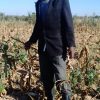
LUSAKA, May 08 (IPS) - For most families in Zambia, April is traditionally a month of plenty—it is typically the beginning of a harvest season for various food and cash crops. Both fresh and dried maize, groundnuts, pumpkins, and a whole variety of both traditional and exotic food crops are usually in full supply and readily available for consumption, supporting household food security and nutrition.
No sign yet of H5N1 bird flu spreading between humans, says WHO chief
- UN News

The H5N1 avian influenza virus has so far shown no signs of adapting to allow human to human transmission, the UN health agency said on Wednesday, urging continued surveillance.
Patients in Rafah ‘afraid to seek services’, WHO reports
- UN News

The World Health Organization (WHO) has taken “crucial steps” in the event of a large-scale Israeli military operation in Rafah, Dr. Ahmed Dahir, team lead of its office in Gaza, told UN News on Tuesday.
Civil Society Scores LGBTQI+ Rights Victory in Dominica
- Inter Press Service

MONTEVIDEO, Uruguay, May 06 (IPS) - On 22 April, Dominica’s High Court struck down two sections of the country’s Sexual Offences Act that criminalised consensual same-sex relations, finding them unconstitutional. This made Dominica the sixth country in the Commonwealth Caribbean – and the fourth in the Eastern Caribbean – to decriminalise same-sex relations through the courts, and the first in 2024.
Peace or war, midwives keep delivering
- UN News

Millions of lives each year rely on the expertise and care of midwives and yet a global shortage is squeezing the profession like never before, the UN sexual and reproductive health agency UNPFA said on Sunday, marking the International Day of the Midwife.
- More stories…
Economy
More Diversified Trade Can Make Middle East & Central Asia More Resilient
- Inter Press Service

WASHINGTON DC, May 17 (IPS) - Dislocations from the pandemic, geoeconomic fragmentation, and Russia’s war in Ukraine have shifted world trade dynamics. While this has created challenges, the redirection of trade has also generated new opportunities, particularly for the Caucasus and Central Asia.
Solomon Islands: A Change More in Style than Substance
- Inter Press Service

LONDON, May 16 (IPS) - There’s change at the top in Solomon Islands – but civil society will be watching closely to see whether that means a government that’s grown hostile will start doing things differently.
Jeremiah Manele is the new prime minister, emerging from negotiations that followed April’s general election. He’s part of OUR Party, led by outgoing four-time prime minister Manasseh Sogavare. The party came first, winning 15 of 50 constituencies, but several incumbents who stood for it lost their parliamentary seats, and Sogavare only narrowly held his. Weakened, Sogavare stood aside to allow Manele to prevail as the consensus candidate of the post-election coalition his party stitched together.
UN forum in Bahrain closes with calls to support women entrepreneurs in conflict areas
- UN News

The bi-annual UN forum on entrepreneurship and innovation wrapped up its work in Bahrain on Thursday focusing on women entrepreneurs from conflict zones, who stressed the importance of investing in their activities as a means of building peace, security, and stability in their communities.
Global economic growth improves but ‘downsides’ lurk
- UN News

The global economic picture has improved since January, but vulnerabilities remain, the mid-year update of the World Economic Situation and Prospects report published on Thursday has revealed.
Chronicle of a Catastrophe Foretold
- Inter Press Service

KUALA LUMPUR, Malaysia, May 15 (IPS) - The IMF warns of a decade ahead of ‘tepid growth’ and ‘popular discontent’, with the poorest economies worst off. But as with inaction on Gaza, little is being done multilaterally to avert the imminent catastrophe.
UN forum in Bahrain endorses declaration on entrepreneurship and innovation for the SDGs
- UN News

Delegates attending a UN forum in Bahrain endorsed on Wednesday a declaration calling on the international community to harness the power of entrepreneurship and innovation in pursuit of the Sustainable Development Goals (SDGs), with a strong emphasis on including women, youth, persons with disabilities and productive families in these efforts.
UN forum in Bahrain: Innovation as the key to solving global problems
- UN News

A major UN forum opened on Tuesday in Bahrain. Its mission: to empower entrepreneurial leaders who can build a brighter future and achieve sustainable development for all.
South Africa will be President of G20 in 2025: Two much-needed Reforms it Should Drive
- Inter Press Service

PRETORIA, South Africa, May 13 (IPS) - South Africa will play an important international role in 2025 as president of the G20. The G20 is a group of 19 countries as well as the African Union and the European Union. Between them they represent 85% of global economy, 75% of world trade and 67% of global population. The G20 defines itself as the premier multilateral forum for international economic cooperation.
The Bleak déjà vu in Darfur
- Inter Press Service
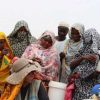
DARFUR, Western Sudan, May 09 (IPS) - As dawn breaks over Darfur, my return after two decades feels heavy. Many millions are suffering once again. Twenty years ago, I was part of the humanitarian effort to make a difference. That was in the early 2000s, when celebrities and world-famous journalists would make the trek in a well-intentioned effort to focus attention on the atrocities across Darfur.
Trade Liberalisation Kicked Away African Development Ladder
- Inter Press Service

KUALA LUMPUR, Malaysia, May 08 (IPS) - Africans have long been promised trade liberalisation would accelerate growth and structural transformation. Instead, it has cut its modest production capacities, industry and food security.
- More stories…
More news topics
Read more news stories by
More news by World, Economy, Environment, Geopolitics, Health, Human Rights, More news topics …
World news powered by and
and 
Issues in depth
Latest
Action on climate change is cheaper than inaction
Many are afraid that tackling climate change is going to be too costly. But increasingly, studies are showing action will not just be cheaper than inaction, but could actually result in economic, environmental and even health benefits, while improving sustainability.
Read “Action on climate change is cheaper than inaction” to learn more.
Climate Change and Global Warming Introduction
 The climate is changing. The earth is warming up, and there is now overwhelming scientific consensus that it is happening, and human-induced. With global warming on the increase and species and their habitats on the decrease, chances for ecosystems to adapt naturally are diminishing.
The climate is changing. The earth is warming up, and there is now overwhelming scientific consensus that it is happening, and human-induced. With global warming on the increase and species and their habitats on the decrease, chances for ecosystems to adapt naturally are diminishing.
Many are agreed that climate change may be one of the greatest threats facing the planet. Recent years show increasing temperatures in various regions, and/or increasing extremities in weather patterns.
This section looks at what causes climate change, what the impacts are and where scientific consensus currently is.
Read “Climate Change and Global Warming Introduction” to learn more.
COP20—Lima Climate Conference
 An overview of the Climate Change Conference (also known as COP 20), held in Lima, Peru in December 2014.
An overview of the Climate Change Conference (also known as COP 20), held in Lima, Peru in December 2014.
While it seemed like it was a successful meeting, because developing nations were committed to drawing up their own plans for emissions reductions for the first time, a number of important issues were left undecided such as how financing would work.
This page is an overview of the Lima Climate conference.
Read “COP20—Lima Climate Conference” to learn more.
Ebola Outbreak in West Africa
An overview of the Ebola virus outbreak in West Africa that has been described by the World Health Organization as the largest, most severe and most complex outbreak in the history of the disease.
The epidemic began at the end of 2013, in Guinea. From there it spread to Liberia, Sierra Leone, Nigeria and Senegal. Many of the affected countries face enormous challenges in stopping its spread and providing care for all patients.
Thousands of people have died and many are at risk as the fatality rate from this virus is very high. As the crisis worsens, as well as the enormous health challenges involved, the social and economic consequences may set these countries back, reversing some gains a number of these countries have made in recent years.
Read “Ebola Outbreak in West Africa” to learn more.
Foreign Aid for Development Assistance
In 1970, the world’s rich countries agreed to give 0.7% of their gross national income as official international development aid, annually.
Since that time, billions have certainly been given each year, but rarely have the rich nations actually met their promised target.
For example, the US is often the largest donor in dollar terms, but ranks amongst the lowest in terms of meeting the stated 0.7% target.
Furthermore, aid has often come with a price of its own for the developing nations. Common criticisms, for many years, of foreign aid, have included the following:
- Aid is often wasted on conditions that the recipient must use overpriced goods and services from donor countries
- Most aid does not actually go to the poorest who would need it the most
- Aid amounts are dwarfed by rich country protectionism that denies market access for poor country products while rich nations use aid as a lever to open poor country markets to their products
- Large projects or massive grand strategies often fail to help the vulnerable; money can often be embezzled away.
This article explores who has benefited most from this aid, the recipients or the donors.
Read “Foreign Aid for Development Assistance” to learn more.
Nature and Animal Conservation
 Preserving species and their habitats is important for ecosystems to self-sustain themselves.
Preserving species and their habitats is important for ecosystems to self-sustain themselves.
Yet, the pressures to destroy habitat for logging, illegal hunting, and other challenges are making conservation a struggle.
Read “Nature and Animal Conservation” to learn more.
Most Popular
Poverty Facts and Stats
Most of humanity lives on just a few dollars a day. Whether you live in the wealthiest nations in the world or the poorest, you will see high levels of inequality.
The poorest people will also have less access to health, education and other services. Problems of hunger, malnutrition and disease afflict the poorest in society. The poorest are also typically marginalized from society and have little representation or voice in public and political debates, making it even harder to escape poverty.
By contrast, the wealthier you are, the more likely you are to benefit from economic or political policies. The amount the world spends on military, financial bailouts and other areas that benefit the wealthy, compared to the amount spent to address the daily crisis of poverty and related problems are often staggering.
Some facts and figures on poverty presented in this page are eye-openers, to say the least.
Read “Poverty Facts and Stats” to learn more.
Global Financial Crisis
 Following a period of economic boom, a financial bubble — global in scope — burst, even causing some of the world’s largest financial institutions have collapsed. With the resulting recession, many governments of the wealthiest nations in the world have resorted to extensive bail-out and rescue packages for the remaining large banks and financial institutions while imposing harsh austerity measures on themselves.
Following a period of economic boom, a financial bubble — global in scope — burst, even causing some of the world’s largest financial institutions have collapsed. With the resulting recession, many governments of the wealthiest nations in the world have resorted to extensive bail-out and rescue packages for the remaining large banks and financial institutions while imposing harsh austerity measures on themselves.
Some of the bail-outs have also led to charges of hypocrisy due to the apparent socializing of the costs while privatizing the profits.
Furthermore, the institutions being rescued are typically the ones got the world into this trouble in the first place. For smaller businesses and poorer people, such options for bail out and rescue are rarely available when they find themselves in crisis.
Plummeting stock markets at one point wiped out 33% of the value of companies, $14.5 trillion. Taxpayers bailed out their banks and financial institutions with large amounts of money. US taxpayers alone have spent some $9.7 trillion in bailout packages and plans. The UK and other European countries have also spent some $2 trillion on rescues and bailout packages. More is expected. Much more.
Such numbers, made quickly available, are enough to wipe many individual’s mortgages, or clear out third world debt many times over. Even the high military spending figures are dwarfed by the bailout plans to date.
This problem could have been averted (in theory) as people had been pointing to these issues for decades. However, during boom, very few want to hear such pessimism. Does this crisis spell an end to the careless forms of banking and finance and will it herald a better economic age, or are we just doomed to keep forgetting history and repeat these mistakes in the future? Signs are not encouraging as rich nations are resisting meaningful reform…
Read “Global Financial Crisis” to learn more.
Causes of Poverty
Poverty is the state for the majority of the world’s people and nations. Why is this? Is it enough to blame poor people for their own predicament? Have they been lazy, made poor decisions, and been solely responsible for their plight? What about their governments? Have they pursued policies that actually harm successful development? Such causes of poverty and inequality are no doubt real. But deeper and more global causes of poverty are often less discussed.
Read “Causes of Poverty” to learn more.
Climate Change and Global Warming
 The climate is changing. The earth is warming up, and there is now overwhelming scientific consensus that it is happening, and human-induced. With global warming on the increase and species and their habitats on the decrease, chances for ecosystems to adapt naturally are diminishing. Many are agreed that climate change may be one of the greatest threats facing the planet. Recent years show increasing temperatures in various regions, and/or increasing extremities in weather patterns.
The climate is changing. The earth is warming up, and there is now overwhelming scientific consensus that it is happening, and human-induced. With global warming on the increase and species and their habitats on the decrease, chances for ecosystems to adapt naturally are diminishing. Many are agreed that climate change may be one of the greatest threats facing the planet. Recent years show increasing temperatures in various regions, and/or increasing extremities in weather patterns.
This section explores some of the effects of climate change. It also attempts to provide insights into what governments, companies, international institutions, and other organizations are attempting to do about this issue, as well as the challenges they face. Some of the major conferences in recent years are also discussed.
Read “Climate Change and Global Warming” to learn more.
Environmental Issues
 Environmental issues are also a major global issue. Humans depend on a sustainable and healthy environment, and yet we have damaged the environment in numerous ways. This section introduces other issues including biodiversity, climate change, animal and nature conservation, population, genetically modified food, sustainable development, and more.
Environmental issues are also a major global issue. Humans depend on a sustainable and healthy environment, and yet we have damaged the environment in numerous ways. This section introduces other issues including biodiversity, climate change, animal and nature conservation, population, genetically modified food, sustainable development, and more.
Read “Environmental Issues” to learn more.
Racism
 Racism is the belief that characteristics and abilities can be attributed to people simply on the basis of their race and that some racial groups are superior to others. Racism and discrimination have been used as powerful weapons encouraging fear or hatred of others in times of conflict and war, and even during economic downturns. This article explores racism from around the world.
Racism is the belief that characteristics and abilities can be attributed to people simply on the basis of their race and that some racial groups are superior to others. Racism and discrimination have been used as powerful weapons encouraging fear or hatred of others in times of conflict and war, and even during economic downturns. This article explores racism from around the world.
Read “Racism” to learn more.
Topical
Global Financial Crisis
 Following a period of economic boom, a financial bubble — global in scope — burst, even causing some of the world’s largest financial institutions have collapsed. With the resulting recession, many governments of the wealthiest nations in the world have resorted to extensive bail-out and rescue packages for the remaining large banks and financial institutions while imposing harsh austerity measures on themselves.
Following a period of economic boom, a financial bubble — global in scope — burst, even causing some of the world’s largest financial institutions have collapsed. With the resulting recession, many governments of the wealthiest nations in the world have resorted to extensive bail-out and rescue packages for the remaining large banks and financial institutions while imposing harsh austerity measures on themselves.
Some of the bail-outs have also led to charges of hypocrisy due to the apparent socializing of the costs while privatizing the profits.
Furthermore, the institutions being rescued are typically the ones got the world into this trouble in the first place. For smaller businesses and poorer people, such options for bail out and rescue are rarely available when they find themselves in crisis.
Plummeting stock markets at one point wiped out 33% of the value of companies, $14.5 trillion. Taxpayers bailed out their banks and financial institutions with large amounts of money. US taxpayers alone have spent some $9.7 trillion in bailout packages and plans. The UK and other European countries have also spent some $2 trillion on rescues and bailout packages. More is expected. Much more.
Such numbers, made quickly available, are enough to wipe many individual’s mortgages, or clear out third world debt many times over. Even the high military spending figures are dwarfed by the bailout plans to date.
This problem could have been averted (in theory) as people had been pointing to these issues for decades. However, during boom, very few want to hear such pessimism. Does this crisis spell an end to the careless forms of banking and finance and will it herald a better economic age, or are we just doomed to keep forgetting history and repeat these mistakes in the future? Signs are not encouraging as rich nations are resisting meaningful reform…
Read “Global Financial Crisis” to learn more.
Climate Change and Global Warming
 The climate is changing. The earth is warming up, and there is now overwhelming scientific consensus that it is happening, and human-induced. With global warming on the increase and species and their habitats on the decrease, chances for ecosystems to adapt naturally are diminishing. Many are agreed that climate change may be one of the greatest threats facing the planet. Recent years show increasing temperatures in various regions, and/or increasing extremities in weather patterns.
The climate is changing. The earth is warming up, and there is now overwhelming scientific consensus that it is happening, and human-induced. With global warming on the increase and species and their habitats on the decrease, chances for ecosystems to adapt naturally are diminishing. Many are agreed that climate change may be one of the greatest threats facing the planet. Recent years show increasing temperatures in various regions, and/or increasing extremities in weather patterns.
This section explores some of the effects of climate change. It also attempts to provide insights into what governments, companies, international institutions, and other organizations are attempting to do about this issue, as well as the challenges they face. Some of the major conferences in recent years are also discussed.
Read “Climate Change and Global Warming” to learn more.
Food and Agriculture Issues
 Food and agriculture goes to the heart of our civilizations. Religions, cultures and even modern civilization have food and agriculture at their core. For an issue that goes to the heart of humanity it also has its ugly side.
Food and agriculture goes to the heart of our civilizations. Religions, cultures and even modern civilization have food and agriculture at their core. For an issue that goes to the heart of humanity it also has its ugly side.
This issue explores topics ranging from the global food crisis of 2008, to issues of food aid, world hunger, food dumping and wasteful agriculture such as growing tobacco, sugar, beef, and more.
Read “Food and Agriculture Issues” to learn more.
Foreign Aid for Development Assistance
In 1970, the world’s rich countries agreed to give 0.7% of their gross national income as official international development aid, annually.
Since that time, billions have certainly been given each year, but rarely have the rich nations actually met their promised target.
For example, the US is often the largest donor in dollar terms, but ranks amongst the lowest in terms of meeting the stated 0.7% target.
Furthermore, aid has often come with a price of its own for the developing nations. Common criticisms, for many years, of foreign aid, have included the following:
- Aid is often wasted on conditions that the recipient must use overpriced goods and services from donor countries
- Most aid does not actually go to the poorest who would need it the most
- Aid amounts are dwarfed by rich country protectionism that denies market access for poor country products while rich nations use aid as a lever to open poor country markets to their products
- Large projects or massive grand strategies often fail to help the vulnerable; money can often be embezzled away.
This article explores who has benefited most from this aid, the recipients or the donors.
Read “Foreign Aid for Development Assistance” to learn more.
Tax Avoidance and Tax Havens; Undermining Democracy
 Through tax havens, transfer pricing and many other policies — both legal and illegal — billions of dollars of tax are avoided. The much-needed money would helped developing (and developed) countries provide important social services for their populations.
Through tax havens, transfer pricing and many other policies — both legal and illegal — billions of dollars of tax are avoided. The much-needed money would helped developing (and developed) countries provide important social services for their populations.
Some tax avoidance, regardless of how morally objectionable it may be to some people, is perfectly legal, and the global super elite are able to hide away trillions of dollars, resulting in massive losses of tax revenues for cash-strapped governments who then burden ordinary citizens further with austerity measures during economic crisis, for example. Yet these super elite are often very influential in politics and business. In effect, they are able to undermine democracy and capitalism at the same time.
As the global financial crisis has affected many countries, tackling tax avoidance would help target those more likely to have contributed to the problem while avoid many unnecessary austerity measures that hit the poorest so hard. But despite rhetoric stating otherwise, it does not seem to high on the agenda of many governments as you might think.
Read “Tax Avoidance and Tax Havens; Undermining Democracy” to learn more.
World Military Spending
World military spending had reduced since the Cold War ended, but a few nations such as the US retain high level spending.
In recent years, global military expenditure has increased again and is now comparable to Cold War levels. Recent data shows global spending at over $1.7 trillion. 2012 saw the first dip in spending — only slightly —since 1998, in an otherwise rising trend.
The highest military spender is the US accounting for almost two-fifths of the world’s spending, more than the rest of the G7 (most economically advanced countries) combined, and more than all its potential enemies, combined.
Read “World Military Spending” to learn more.
“If a man is offered a fact which goes against his instincts, he will scrutinize it closely, and unless the evidence is overwhelming, he will refuse to believe it. If, on the other hand, he is offered something which affords a reason for acting in accordance to his instincts, he will accept it even on the slightest evidence.” — Bertrand Russell, Roads to Freedom
 Global Issues
Global Issues